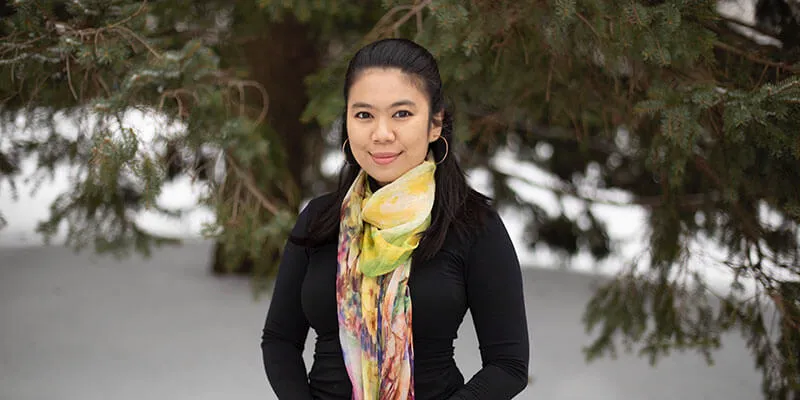“Any of us can learn to develop psychological resilience in the face of adversities,” says clinical psychology student Phyu Pannu Khin. During a pandemic, she notes, this is a particularly valuable skill for all to have. But for the resettled refugees and migrant families she treats in her PhD program, it’s key to life after trauma.
For her work building psychological resiliency among these communities in Vermont, Khin recently earned a P.E.O. International Peace Scholarship Award of $12,500, which supports international women pursuing studies in the U.S. or Canada.
“As a child, I never thought I’d end up studying alone in the U.S.,” admits Khin, who was born and raised in Burma under a former dictatorship during one of the world’s longest civil wars. “My dad was a former political prisoner because of his activism against the former dictatorship,” she says, explaining that many of the patients she works with through UVM’s Connecting Cultures Program have survived similar psychological and physical trauma, including overcoming torture. “I witnessed first-hand the power of psychological resilience exhibited by many individuals in my own community.”
Their experiences certainly hit close to home for Khin, but the opportunity to treat underserved patients and develop culturally sensitive evidence-based practices tailored to their needs is what ultimately drew her to UVM. The psychological services Khin provides are among a handful of resources available to patients who come through the Connecting Cultures program.
Learn more about the work Khin does with the Connecting Cultures program:
Led by Professor Karen Fondacaro, the program holistically serves the community with psychological support, physical therapy and also legal support. For the extraordinary community engagement initiatives led by Fondacaro, the program recently received a 2020 W.K. Kellogg Foundation Community Engagement Scholarship Award.
Working closely with Fondacaro, Khin admires the authenticity and support she brings to the work and their patients. “She really works to build a strong partnership with the refugee communities in Burlington so that we’re coming from the clinical framework and research questions that focus on what our refugee communities really need from us and what we can learn from them,” she says.
But what really pulled her to Vermont all the way from Burma, via Montana for her undergrad degree, is Professor Keith Burt, associate professor of clinical psychology. “He is a main reason why I came to UVM since his research examines processes of risk and resilience during development, and he has been an amazing source of support for me.” His work caught Khin’s attention while she was working in Boston as a mental health provider, and the rest is history.
In the end, with her interest in the psychological study of resilience, trauma and adversity, Khin hopes to bring culturally affirming clinical treatments to regions around the world that may lack access to or prioritize psychological health. She would also like to follow in the footsteps of her mentors and become a professor who trains clinicians to disseminate evidence-based psychological services in low-resource communities. “What I currently get to do in my program is what I mostly dream of continuing to do for the rest of my career,” Khin says.
